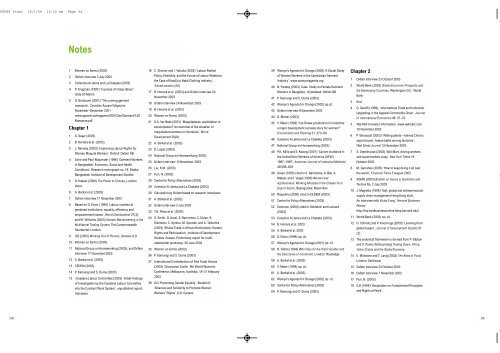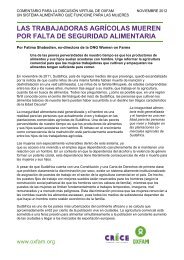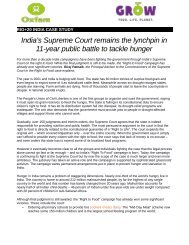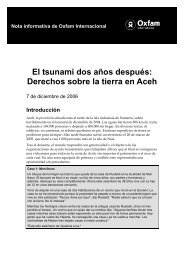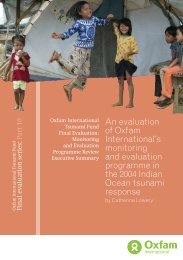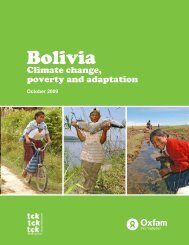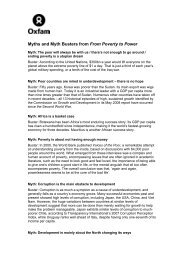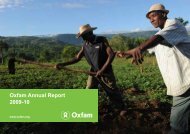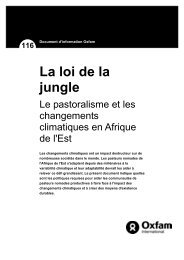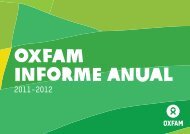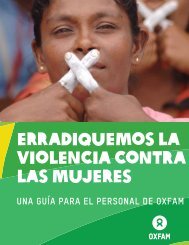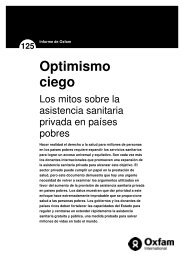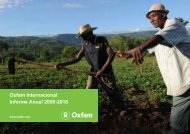Trading Away Our Rights - Oxfam International
Trading Away Our Rights - Oxfam International
Trading Away Our Rights - Oxfam International
You also want an ePaper? Increase the reach of your titles
YUMPU automatically turns print PDFs into web optimized ePapers that Google loves.
EPORT final 19/1/04 10:20 am Page 94Notes1 Women on Farms (2003)2 <strong>Oxfam</strong> interview 3 July 20033 Collectivo Al Jaima and La Chabaka (2003)4 P. Krugman (1997) ‘In praise of cheap labour’,Slate 20 March5 D. Birnbaum (2001) ‘The coming garmentmassacre’, Canadian Apparel MagazineNovember–December 2001www.apparel.ca/magazine/2001Dec/Garment%20Massacre.pdfChapter 11 G. Sayer (2003)2 B. Herrera et al. (2003)3 J. Ramsey (2003) ‘Improving Labour <strong>Rights</strong> forWomen Maquila Workers’, Oxford: <strong>Oxfam</strong> GB4 Zohir and Paul-Majumder (1996) ‘Garment Workersin Bangladesh: Economic, Social and HealthConditions’, Research monograph no. 18, Dhaka:Bangladesh Institute of Development Studies5 N. Kabeer (2000) The Power to Choose, London:Verso6 A. Barkat et al. (2003)7 <strong>Oxfam</strong> interview 17 November 20038 Based on D. Elson (1999) ‘Labour markets atgendered institutions: equality, efficiency andempowerment issues’, World Development 27(3),and M. Williams (2003) Gender Mainstreaming in theMultilateral <strong>Trading</strong> System, The CommonwealthSecretariat: London9 ILO (2003) Working Out of Poverty, Geneva: ILO10 Women on Farms (2003)11 National Group on Homeworking (2003), and <strong>Oxfam</strong>interview 17 November 200312 A. Barkat et al. (2003)13 CEDEM (2003)14 P. Kamungi and S. Ouma (2003)15 Cisadane Labour Committee (2003) ‘Initial Findingsof Investigation by the Cisadane Labour Committeeinto the Contract Work System’, unpublished report,Indonesia16 C. Skinner and I. Valodia (2002) ‘Labour MarketPolicy, Flexibility, and the Future of Labour Relations:the Case of KwaZulu-Natal Clothing Industry’,Transformation (50)17 B. Herrera et al. (2003) and <strong>Oxfam</strong> interview 24November 200318 <strong>Oxfam</strong> interview 24 November 200319 B. Herrera et al. (2003)20 Women on Farms (2003)21 K.A. Ver Beek (2001) ‘Maquiladoras: exploitation oremancipation? An overview of the situation ofmaquiladora workers in Honduras’, WorldDevelopment 29(9)22 A. Barkat et al. (2003)23 D. López (2003)24 National Group on Homeworking (2003)25 <strong>Oxfam</strong> interview 10 November 200326 Liu, K.M. (2003)27 Pun, N. (2003)28 Centre for Policy Alternatives (2003)29 Colectivo Al Jaima and La Chabaka (2003)30 Calculation by <strong>Oxfam</strong> based on research interviews31 A. Barkat et al. (2003)32 <strong>Oxfam</strong> interview 2 July 200333 T.B. Pérez et al. (2003)34 S. Smith, D. Auret, S. Barrientos, C. Dolan, K.Kleinbooi, C. Njobvu, M. Opondo, and A. Tallontire(2003) ‘Ethical Trade in African Horticulture: Gender,<strong>Rights</strong> and Participation’, Institute of DevelopmentStudies, Sussex. Preliminary report for multistakeholderworkshop, 26 June 200335 Women on Farms (2003)36 P. Kamungi and S. Ouma (2003)37 <strong>International</strong> Confederation of Free Trade Unions(2003) ‘Discussion Guide’, 8th World Women’sConference, Melbourne, Australia, 18–21 February200338 ILO ‘Promoting Gender Equality’, Booklet 6:‘Alliances and Solidarity to Promote WomenWorkers’ <strong>Rights</strong>’, ILO: Geneva39 Womyn’s Agenda for Change (2002) ‘A Social Studyof Women Workers in the Cambodian GarmentIndustry’, www.womynsagenda.org40 N. Pandey (2003) ‘Case Study on Female GarmentWorkers in Bangalore’, Hyderabad: <strong>Oxfam</strong> GB41 P. Kamungi and S. Ouma (2003)42 Womyn’s Agenda for Change (2002) op.cit.43 <strong>Oxfam</strong> interview 9 December 200244 G. Moher (2003)45 V. Meier (1999) ‘Cut-flower production in Colombia:a major development success story for women?’Environment and Planning 31: 273–8946 Colectivo Al Jaima and La Chabaka (2003)47 National Group on Homeworking (2003)48 P.K. Mills and S. Kwong (2001) ‘Cancer incidence inthe United Farm Workers of America (UFW)1987–1997’, American Journal of Industrial Medicine40:596–60349 Green (1995) cited in S. Barrientos, A. Bee, A.Matear, and I. Vogel (1999) Women andAgribusiness: Working Miracles in the Chilean FruitExport Sector, Basingstoke: Macmillan50 Riquelme (2000) cited in CEDEM (2003)51 Centre for Policy Alternatives (2003)52 Solomon (2000) cited in Goldstein and Leonard(2003)53 Colectivo Al Jaima and La Chabaka (2003)54 B. Herrera et al. 200355 A. Barkat et al. 200356 D. Elson (1999) op. cit.57 Womyn’s Agenda for Change (2001) op. cit.58 N. Folbre (1994) Who Pays for the Kids? Gender andthe Structures of Constraint, London: Routledge59 A. Barkat et al. (2003)60 V. Meier (1999) op. cit.61 A. Barkat et al. (2003)62 Womyn’s Agenda for Change (2002) op. cit.63 Centre for Policy Alternatives (2003)64 P. Kamungi and S. Ouma (2003)Chapter 21 <strong>Oxfam</strong> interview 23 October 20032 World Bank (2003) Global Economic Prospects andthe Developing Countries, Washington D.C.: WorldBank3 Ibid.4 G. Gereffi (1999), ‘<strong>International</strong> Trade and IndustrialUpgrading in the Apparel Commodity Chain’, Journalof <strong>International</strong> Economics 48: 37–705 Wal-Mart Investor information. www.walmart.com10 November 20036 P. Wonacott (2003) ‘Wilting plants – behind China’sexport boom, heated battle among factories’,Wall Street Journal 13 November 20037 S. Greenhouse (2003) ‘Wal-Mart, driving workersand supermarkets crazy’, New York Times 19October 20038 M. Garrahan (2003) ‘How to keep doing it all overthe world’, Financial Times 5 August 20039 SOMO (2003) Bulletin on Issues in Garments andTextiles No. 2 July 200310 J. Magretta (1998) ‘Fast, global and entrepreneurial:supply chain management Hong Kong style.An interview with Victor Fung’, Harvard BusinessReviewhttp://harvardbusinessonline.hbsp.harvard.edu/11 World Bank (2003) op. cit.12 H. Schmitz and P. Knorringa (2000) ‘Learning fromglobal buyers’, Journal of Development Studies 37(2)13 The analytical framework is derived from P. Gibbonand S. Ponte (forthcoming) <strong>Trading</strong> Down: Africa,Value Chains and the Global Economy14 E. Millstone and T. Lang (2003) The Atlas of Food,London: Earthscan15 <strong>Oxfam</strong> interview 23 October 200316 <strong>Oxfam</strong> interview 7 November 200317 Pun, N. (2003)18 ILO (1998) ‘Declaration on Fundamental Principlesand <strong>Rights</strong> at Work’,9495


